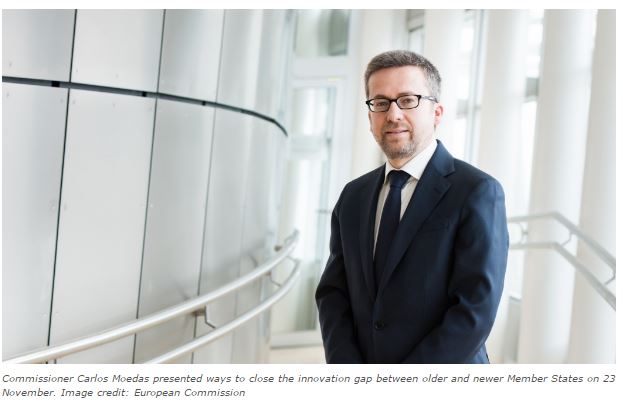
On Tuesday the 21st February 2017 Interreg will be visiting BU 10.30-16.00 at the EBC.
Interreg is an economic development programme that funds innovation, low carbon, climate change and resource efficiency projects which take place across EU countries and regions. These projects aim to find common solutions to common problems which exist in multiple countries. BU has been awarded and is involved in projects from the Channel, 2 Seas and Atlantic schemes.
This event is aimed at people in the Dorset, Hampshire, Wiltshire and Isle of Wight areas and nearby cities that are new to the Interreg programme, who are confused about which programme is which, or who are just beginning to develop a project idea.
For people who are drafting an application, or who want feedback on an application they have submitted, the programmes offer other workshops. For example the 2Seas cross border programme will run a Step 1 applicants’ workshop on 27th January 2017 in Bristol, and a step 2 applicants’ workshop on 13th February, also in Bristol. These are open to all applicants in the eligible area. See www.interreg2seas.eu for further information.
Our event will be split into two parts.
The first part will include;
- An introduction to Interreg: The Interreg programmes, how they are different from each other and from other EU funds. This will also cover the types of project that are funded.
- Tips on how to develop a good Interreg project: Lessons from the selection process by Sallyann Stephen from The Department for Communities and Local Government, based on her experience on the Interreg project selection panel.
- How to apply: the two stage process going through the selection criteria and the key documents involved.
The second part will have a more informal set up with interactive exercises to get you thinking, collaborating and developing project ideas.
Throughout the afternoon there will also be one to one appointments on specific project ideas with one of the Interreg facilitators. This is an excellent opportunity to develop a project and get feedback from the experts. If you would like to book a one to one session you will need to email Dianne Goodman at dgoodman@bournemouth.ac.uk. Places will be allocated on a first come first served basis, if you have specific preferences on the time we recommend you contact Dianne as soon as possible so your request can be accommodated.
Please note that to attend the one to one session you are required to send a 1 page project summary to Paula MacLachlan, 2 Seas Territorial Facilitator p.maclachlan@interreg2seas.eu no later than 14th February. Apologies, without this ahead of time they will be unable to prepare adequately for your personal one to one session.
The presentation is open also to the regional university network, known as the M3 group, which includes: AUB, Bournemouth, Brighton, Portsmouth, Reading, Southampton, Southampton Solent, Surrey, Sussex and Winchester. All academics and research offices are welcome to attend. BU will host a networking lunch for all attendees. This is a great opportunity to learn about Interreg and how you can strengthen your applications for funding. If you would like to attend, then please book through Eventbrite.
For further information on this event please contact: RKEDevFramework@bournemouth.ac.uk
*Please note as Interreg programmes operate in set geographical areas you must check the programme websites to ensure eligibility.




 Last week I attended COST Action Training School BEYOND BIRTH COHORTS: from study design to data management which was conducted from November 23- 25 in Valencia, Spain. COST (European Cooperation in Science and Technology) is a unique platform where European researchers can jointly develop their ideas and initiatives across all scientific disciplines through trans-European networking of nationally funded research. The specialist training to which I was invited focused conducting longitudinal cohort studies especially birth cohorts.
Last week I attended COST Action Training School BEYOND BIRTH COHORTS: from study design to data management which was conducted from November 23- 25 in Valencia, Spain. COST (European Cooperation in Science and Technology) is a unique platform where European researchers can jointly develop their ideas and initiatives across all scientific disciplines through trans-European networking of nationally funded research. The specialist training to which I was invited focused conducting longitudinal cohort studies especially birth cohorts.










 This session will be delivered by BU’s account manager from the UK Research Office. UKRO are the leading support body within the UK for EU funding.
This session will be delivered by BU’s account manager from the UK Research Office. UKRO are the leading support body within the UK for EU funding.










 Visiting Prof. Sujan Marahatta presenting at BU
Visiting Prof. Sujan Marahatta presenting at BU 3C Event: Research Culture, Community & Can you Guess Who? Friday 20 March 1-2pm
3C Event: Research Culture, Community & Can you Guess Who? Friday 20 March 1-2pm Beyond Academia: Exploring Career Options for Early Career Researchers – Online Workshop
Beyond Academia: Exploring Career Options for Early Career Researchers – Online Workshop UKCGE Recognised Research Supervision Programme: Deadline Approaching
UKCGE Recognised Research Supervision Programme: Deadline Approaching SPROUT: From Sustainable Research to Sustainable Research Lives
SPROUT: From Sustainable Research to Sustainable Research Lives ECR Funding Open Call: Research Culture & Community Grant – Apply now
ECR Funding Open Call: Research Culture & Community Grant – Apply now ECR Funding Open Call: Research Culture & Community Grant – Application Deadline Friday 12 December
ECR Funding Open Call: Research Culture & Community Grant – Application Deadline Friday 12 December MSCA Postdoctoral Fellowships 2025 Call
MSCA Postdoctoral Fellowships 2025 Call ERC Advanced Grant 2025 Webinar
ERC Advanced Grant 2025 Webinar Update on UKRO services
Update on UKRO services European research project exploring use of ‘virtual twins’ to better manage metabolic associated fatty liver disease
European research project exploring use of ‘virtual twins’ to better manage metabolic associated fatty liver disease